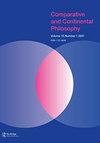Qing (情), Gan (感), and Tong (通): Decolonizing the Universal from a Chinese Perspective: Part 1
IF 0.3
0 PHILOSOPHY
引用次数: 0
Abstract
ABSTRACT The theoretical and moral bedrock of Western colonialism has been its claim to “universalism.” Central to this universalism is a Cartesian dualism in which only the disembodied mind has access to the universal, and the body, as a mere particular, does not. This paper (Part 1) and the following paper (Part 2) propose an alternative model of “universalism” as the totality of interactions between embodied particulars. This model of “universalism” is based on the relationship between the classical Chinese philosophical concepts of “feeling” (qing, 情), interaction (gan, 感), and the unimpeded free-flow (tong, 通) that results. This Chinese model of universalism is ultimately based on the organicist metaphysics of life that understands meaning and order to be the result of organic interaction between bodies. this paper will show how the dominant Chinese tradition understood the universal as a result of the sympathetic interaction between embodied particulars.清(音)、干(音)、通(音):从中国视角看世界的非殖民化:第一部分
本文章由计算机程序翻译,如有差异,请以英文原文为准。
求助全文
约1分钟内获得全文
求助全文

 求助内容:
求助内容: 应助结果提醒方式:
应助结果提醒方式:


